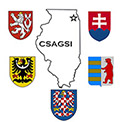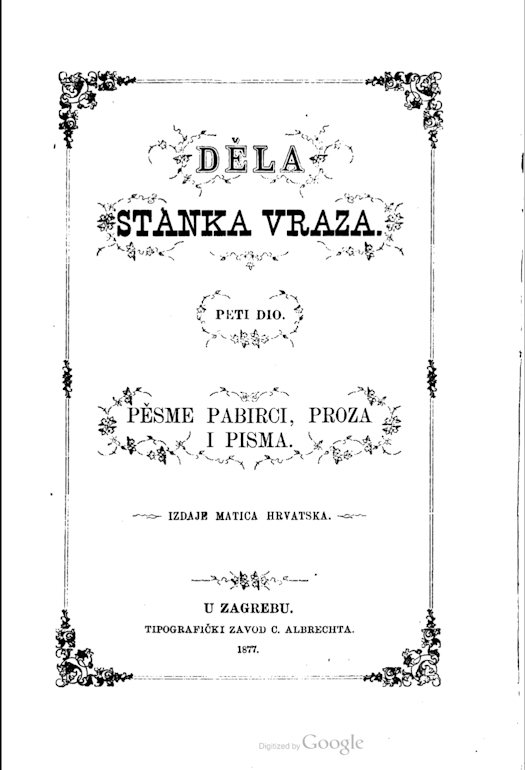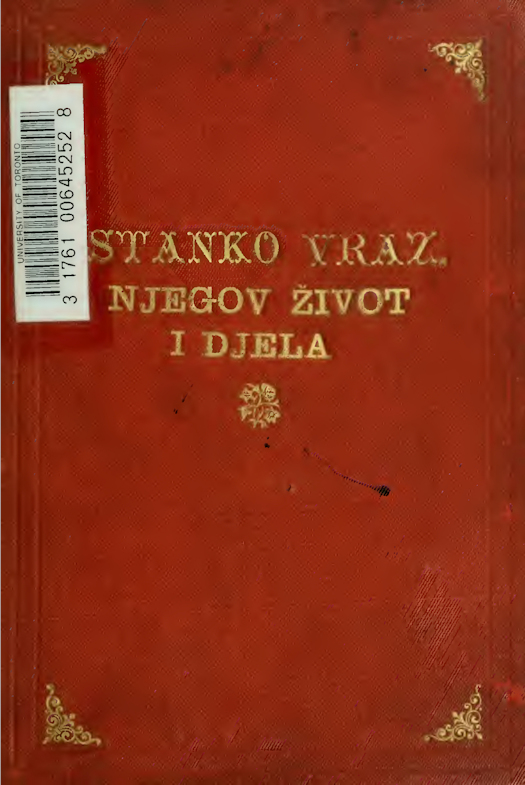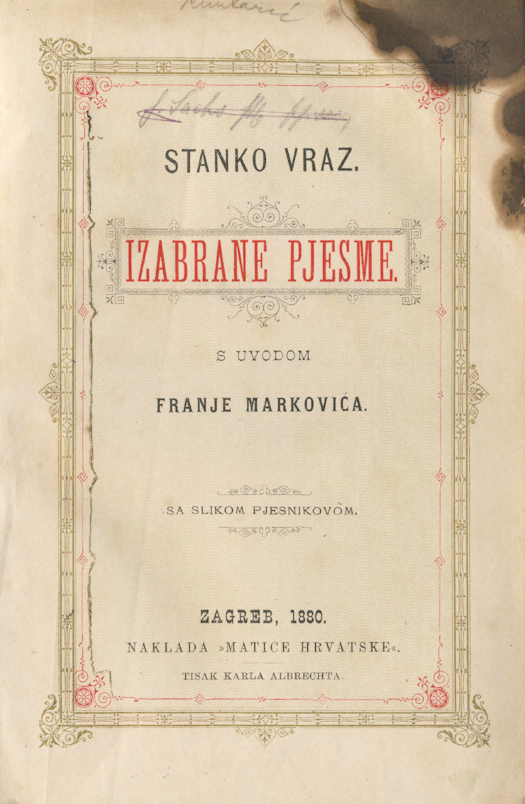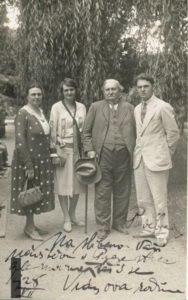The Family Of:
Vlasta Geringer Vraz - Enrique Stanko Vraz
Daughter Vlasta Adele Vraz
Vlasta Geringer Vraz
Ancestry has a listing for Vlasta's birth as 8-2-1874.. Saint Wenceslaus Catholic Church records seem to confirm this.
Census 1880 Illinois, Cook, Chicago, D89, Page 10, 463 Canal
August Geringer 38, Antonia 35, Miloslav 9, Vladimir 7, Vlasta 5, Augusta 3
Ancestry has a ship record listing a departure , 9-9-1885, aboard the ship Suevia, from Port Hamburg to Port New York City for Chicago residents, Antonie Geringer 39, Vlasta 9, August 8, arriving on 9-24-1885.
Vlasta Geringer married Enrique Stanko Vraz on 12-28-1897 in Chicago.
Census 1900 Illinois, Cook, Chicago, Ward 7, D179, Page 12 150 12th Street
August Geringer 55, Antonia 52, (7 Children, 4 Surviving), Miles 29, Vladimir 27, August 22, Vlasta Mraz (Vraz), Stanislaw Mraz 38, Emil Camsky (Nephew 20, Here 1898)
Census 1910 Illinois Cook Chicago Ward 34D1984 Page 29 1608 Clifton Park Avenue
EST Vraz 50, Vlasta 34, Victor 6, A. Geringer (Antonia) 62
1940 California Los Angeles Los Angeles 60-332 Page 21 849 Gramercy Place
Augusta Psenka 62
Vlasta Vraz 64, Vlasta Adele Vraz 35
Berwyn Life, October 22, 1961
“Mrs. Vlasta Vraz, 86, of 2101 Elmwood Ave., the daughter, of the founder of the first Czech daily in the United States, the Svornost, died Friday at home after a long illness, A Berwyn resident for 25 years, Mrs. Vraz’s father August Geringer and his family settled in Chicago in 1866 and helped in the settling of Czech immigrants throughout the United States. Mrs. Vraz was a member of the Czechoslovak National Council and active in the American Red Cross, Her daughter Vlasta Adele is an executive Vice' president on the council. Funeral services will be held at 3 p.m. tomorrow, at the chapel, 6301 Cermak rd., with interment following in Bohemian National Cemetery. Besides her daughter, Mrs. Vraz is survived by a grandson, a graduate of Columbia law school. Mrs. Vraz's late husband, Stanislav, was a renowned Czech author and traveler. Her late son, Prof Victor Vraz, was a cum laude graduate of Northwestern University. He taught commerce.”
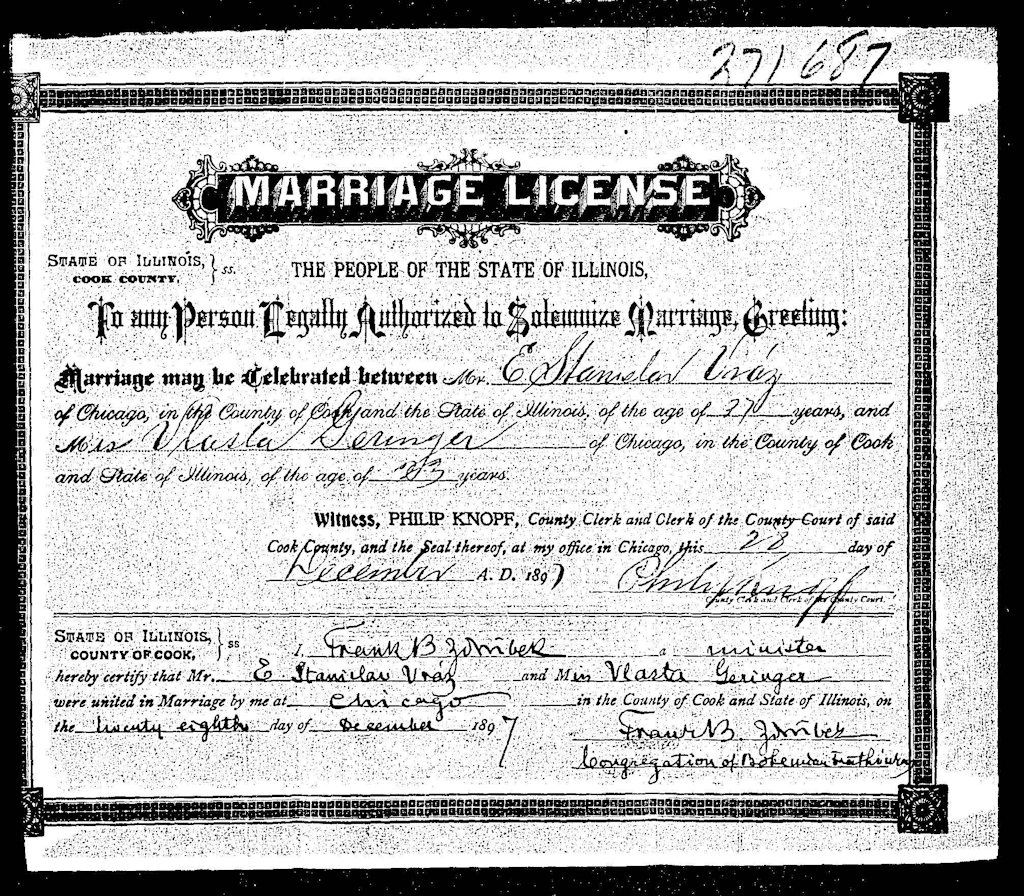
E Stanko Vraz – Amerikan Narodni Kalendar 1933
On 21 February last year, Czechoslovak America was surprised by the news that Enric Stanko Vráz, a prominent Czech traveler, writer and well-known travel lecturer, died in Prague in a gray flat in Holešovice the morning of the morning. Even in America, Vráz was well known; there was almost no Czechoslovak settlement in the United States in which he would not have lectured in 1900—1918. He was also known to readers of the American calendar not only as the son-in-law of the founder and publisher of Svornosti and the American, but also as an occasional contributor who for several years organized the article “From the Life of Fellow Countrymen in Far Abroad”. Even his children Vlasta and Viktor are readers of this publication known for their contributions. That is why Enric Stanko Vráze has enjoyed extraordinary interest and importance for our readers.
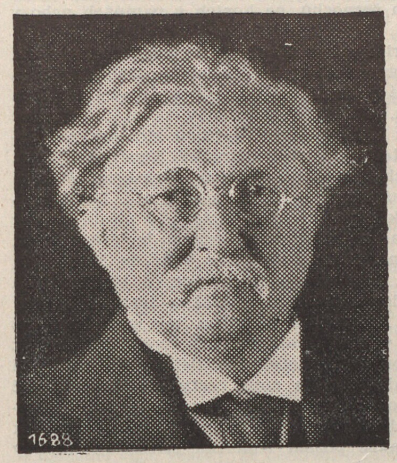 Recent reports, received by post the day before the fateful radiogram, reported that Vráz had been bedridden for several weeks with heart problems and swelling. After the severe illnesses he had experienced in his advanced age, when his left arm was taken away from his shoulder twelve years ago in Chicago and then in Prague in 1923, when he suffered from almost complete paralysis of his entire body, not only in Prague and its surroundings, but also in more distant places, to which he often took difficult and strenuous tours. In recent years, he has also been a regular radio speaker.
Recent reports, received by post the day before the fateful radiogram, reported that Vráz had been bedridden for several weeks with heart problems and swelling. After the severe illnesses he had experienced in his advanced age, when his left arm was taken away from his shoulder twelve years ago in Chicago and then in Prague in 1923, when he suffered from almost complete paralysis of his entire body, not only in Prague and its surroundings, but also in more distant places, to which he often took difficult and strenuous tours. In recent years, he has also been a regular radio speaker.
Enric Stanko Vráz, the son of an emigrant, was born in the Bulgarian town of Trnov, when his parents were on their way from Crimea to Carihrad. Although he only attended schools abroad, Vráz acquired a knowledge of the Czech language, to which he stuck with his heart. After the death of his father and the great financial catastrophe that struck the family, Vraz ended his studies, devoted himself to traveling for science and traveled as a young man of 20 years, then very inaccessible and dangerous Europeans Morocco and Sahara. He had resorted to various disguises. He traveled sometimes as a Jew, sometimes as a Mohammedan, and guessed by collecting nature's cruel livelihood.
Later he went further south on a journey along the coast of West Africa and discovered many rare and new ones himself. He traveled continually Africa for eight years among black tribes, often months, even years inland, as a single white man. - He recognized part of Senegal, Gambia, inland, and part of the Portuguese territory of Bisoagos, arriving in Sierra Leone, the Republic of Liberia on the Pepper Coast. He lived for a long time on the Gold Coast, from where he made trips to the interior of dark Africa. For example, in Ashanti, Africans, the upper reaches of the Volta, in Eve on the border of Dahome, etc. In eight years of hardship and great danger, natives and murderous climates still threatened, Vráz knew more than 40 different of peoples, or of nations, some of which he had to learn. While he came to Morocco with the remnants of his fortune, on his other travels he was dependent only on the yield of his hunt. He hunted here lions and elephants. After the third serious illness, he went to the Canary Islands, where he recovered so much by a one-year stay that he could continue his travels again. From Teneriffe went to the islands of the Antilles, then traveled to Venezuela and then to Orinoco. His journey across the equatorial America, to the mouth of Orinoco along rivers and mysterious, dangerous forests all the way to Brazil, Peruvia, and through the Peruvian Andes to the Pacific Ocean was magnificent. Further by sea he went to Ecuador, Panama, Columbia and back to Venezuela. In doing so, he gave his life a chance again, as the road led through wild lands where the European foot had not yet set foot. He traveled with wild Indians, again in the company of civilized rudochů with countries already densely populated. On these journeys he made a happy discovery of rubber mud, which he collected in Venezuela to employ up to 600 Indians. The company was the source of his income, which he again turned to research his travels. After fourteen years of travel, very ill and deprived of disaster with the mud of all his savings, Vraz returned to Europe and visited old friends in Prague, which he knew only from letters. In Prague, he suddenly earned the hearts of everyone, that tireless, courageous man of steel constitution, who was in the salons as in his element as in the Bedouin tents, huts of blacks, horses in pampas, or the canoes of South American Indians.
After a short stay in the Czech Republic and America, he made a magnificent journey around the world. Among others, he traveled Hawaii, Japan, China, Kochi, Rear India and Ceylon. He made further research and collecting trips to Borneo, to skull hunters and to the Papuan people, to New Guinea. Both of these routes were very dangerous and expensive. On the way back he visited Siam and, in addition to the islands of Molucca, Celebes, Java, Bali and Lombok, he also traveled the Salus archipelago, south of the Philippines.
In America he traveled at different times in North America, Mexico, Central America, lived in Arizona for months, Navajo Indians, Hopi, Pueblo, etc. Another interesting journey led him to China to Beijing, where after the Boxer Rebellion, troops joined in the city he had been busy studying and photographing places, battlefields, palaces, never before visited by Europeans. From China, Vraz went to Manchuria, then visited Japan and Korea for the third time, where he lived for three months. From Vladivostok he traveled through Siberia on the Amur, Silce and then the Siberian Railroad.
Another period of trips is a trip to South America around the mainland, the purpose of which was to get to know all the capitals of all South American republics, as previously five-year journey was to know the interior, forests, mountains and mountains of North South America. And again our Odysseus sets out on a new journey through Mexico across Yukatan to the ruins of Indian cities, into the forests overgrown with palaces of the Aztecs, the Toltecs, the Majors. On the way back he visited the east coast of Central America, the republics of Guatemala, Honduras, Costa Rica, etc., so he knew America all over, from Canada to the Land of Fire.
Vraz traveled alone with the natives and most of the paths, not as a tourist who travels the world, but as an explorer who lived among the most primitive nations, ate, slept and hunted as one of them.
The Czechoslovak nation fell in love with Vraz, he loved it sincerely. Young, old, read, heard, admired his wonderful descriptions of distant worlds, whether spoken or printed. Vráz's eye-catching travelogues were also accompanied by his original and incomparable paintings. There was a rich, scientific content connected with my own poetic images of poetry. A beautiful memory published in “Czechoslovakia” contributed to the appreciation of Vráz's old and faithful to his kind prof. Josef Kořenský.
We attach a memory here to the above printed biographical feature: Hardly any other surname was pronounced among the Czechs in Moravia, Silesia, Vienna and the United States of America a few years ago as often as the name Vrázovo. Prague naturalists knew them almost half a century ago, know everything from the mouth of the immortalized friend Václav Frič, the owner of the renowned nature shop, that the admirable queen of termites or termites and the giant goliath beetles exhibited in his plant come from a West African collector E. St. Vráz. Underneath the mighty queen, housed in a crystal vessel, there was neither the winged king as a male, nor the tiny, blind, and wingless workers and the more robust warriors in charge of the termite state defense. The eyes of contemplative scientists rested with great interest in the tiny, but still famous tsetse fly, memorable for being a disseminator of the deadly disease of sleep. Prague's natural spirits then saw other appearances in Frič's race for the first time. They saw electric catfish and a double-fish that can be preserved! in the river alive with his lungs, if he is forced to live in mud, if the water dries. He could collect such natural products! in hot Africa only collector whimsical, we said unanimously. This was confirmed by the magical collection of beetles, which also appeared in the shop window of a glazier in Spálená Street. A cluster of glorious goliaths with a white and dark-brown garlic garment prompted all pedestrians to look at the handsome West African faces for a moment. Not many insects were so abducted by the magnificence of that great giant that he multiplied his collections by paying five gold for the Goliath. Entomological collections were already praised by several Prague citizens. We knew the nature sent by Vráz to Bohemia before the naturalist himself. For the ethnographic sights from Africa, Vráz was able to thank the Náprstek Museum only in silence. Professor Frič from the Czech Museum. The promised land of collectors seemed to be Vraz's lands on the Gulf of Guinea, as is the Golden Coast. Liberia and Sierra Leone. A daring collector would have been brave of his expedition almost in his life when he was captured by the irritated Asanti and dragged into the camp in handcuffs. But he was lucky. He escaped with life and became a mentor and a doctor of the natives.
He wrote about himself to Prague that he always wanted something else, with nowhere to stand. Coincidence wished him. It was on the Moroccan coast of Tangier, where an unknown guest was sitting in a café on a narrow street reading "National Letters". Vraz heard his name was Jaroslav Brazda and he came from Prague to show entomological appetites in Africa. Under the convention of both naturalists, it was decided to pursue the export of orchids from the north of South America. So they left the African West, sailed the Atlantic Ocean to the Caribbean Sea in 1889, stayed on the island of Trinidad, settled in Venezuela to export orchids, but preferred to export mud gum. The company succeeded, and Vráz gained so much that he could make a memorable journey in 1893 across Equatorial America. He named his one boat "Praga", decorated it with the Czech flag, sailed through the Orinoco happy rapids, embarked with the hired red march of the high Andes passes, saw the shiny plains of the Pacific Ocean after terrible suffering, crossed Panama and embraced his comrade back to Trinidad.
I was happy that I could take away money from Vráz's friends to the Prague banker. Apparently they came to Manaus when our globetrotter needed them supremely. It was not even a year since that trip, when a servant came to my school in Smíchov with a message from Náprstek. "The carriage is here", called Happy Vojta Thimble triumphantly. “And he didn't come alone. He also has a living sloth, a live possum with eleven cubs on his back, and several live tarantulas. ” The reading room was suddenly busy, like in an apiary. He came naturally to see the adored Murder. But Vráz only went from hand to hand when he gave his first lecture on November 26, 1894 and inclined all his listeners to his breathtaking speech. There was no one in the man's thirty-four-year-old, flexible and resilient figure to see how often he struggled with death on his travels. But the kneaded and callous nice fortune tells that he did not have the celebrated Vráz made of roses. After lectures in Prague, Vráza gave all the places in Bohemia and Moravia throughout the year, and the speaker spoke to both adults and children. Of the mined fee, Vráz not only looked at himself, but often shared it with the needy. It was obvious from Vráz's letters that the wandering collector was an enemy of women, but he was not spared from Cupid's arrow in Prague. He looked into the lure eyes of a young Chicagoan woman, and she became his wife three years later.
He grew rich in our welfare, hurried after a year our restless man with saved capital to countries unknown and thus made a journey around the world, not only the Asian mainland, but also nearby islands. On Bomeo, the orangutans were on fire, returning from New Guinea with trophies of magical paradises feathered with gems. In 1897 he moved to America, where he found his second home in Chicago with the family of his bride, Miss Vlasta, daughter of the prominent Czech-American publisher of Czech magazines, Mr. August Geringer.
In 1897 Vráz made his way to Mexico with his wife, climbed the volcanic mountain Popokatepetl, spent several years in America, also watched the horror of the boxing uprising in China, collects constantly ethnographic monuments and sailed to Europe in 1921 to settle permanently in Prague with his family and took up his lecture again. Various diseases made Vráz's life uncomfortable, but his left hand amputation in America was the most painful for him. The condition deteriorated even more when Vráz was forced to search! eight years ago to help in the Sanatorium Podolsky. But even this time the fierce soul of the desperate patient had frightened Morana, so our Vráz lived almost against the will of the Aeskulap. The news about Vráz's health sounded unhappy at the beginning of 1932, and on the morning of February 20, a sad news spread across Prague that the patient had died in his Holesovice apartment, leaving behind a devoted wife, daughter of Vlasta Adéla and son Viktor, University Associate Professor in Chicago.
The great gifts that Vráz contributed to the uplifting of the ethnographic collections of the Náprstek Museum will proclaim the patriotic enthusiasm of a poor patron. Numerous viewers will also be gratefully remembered at Vraz if their eyes rest on fairy-tale paradises and hummingbirds displayed in the halls of the National Museum. With a grateful memory, Vráz will live in our nation with his travelogues "Across Equatorial America" (1900), "In Siam" (1901), "China" (1904) and "From the Travel of E. St. Vráz”(1897). His “Exotic Stories” reveal their creative spirit and dreamy poetry with their take-off.
Enrique Stanislav "Stanko" Vraz
Czech Radio Article
https://www.radio.cz/en/section/czechs/enrique-stanko-vraz-
Enrique Stanko Vraz
Alena Skodova
17-04-2002
Enrique Stanko Vraz is a traveler who has won a place Czech people's memory, which is proved by the fact that when his books were published in the 1980s, readers of all ages showed immense interest in them, despite the fact that they were written some 100 years ago. I spoke with associate professor Josef Kandert from the Department of Sociology at Charles University in Prague.
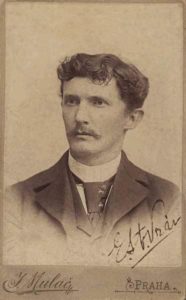 "Vraz was a traveller who showed great talent in what we would call in modern terms marketing and promotion. One of the main facts that undoubtedly added to his charismatic personality was his origin, which has remained shrouded in mystery till today, although many academics have worked on finding new facts about this remarkable man. He himself used to say - but his claims changed very often - that he was born in 1860 in Bulgaria, where his father was a diplomat and Enrique, as a young cadet, reportedly fought against the Turks and was seriously wounded."
"Vraz was a traveller who showed great talent in what we would call in modern terms marketing and promotion. One of the main facts that undoubtedly added to his charismatic personality was his origin, which has remained shrouded in mystery till today, although many academics have worked on finding new facts about this remarkable man. He himself used to say - but his claims changed very often - that he was born in 1860 in Bulgaria, where his father was a diplomat and Enrique, as a young cadet, reportedly fought against the Turks and was seriously wounded."
In any case, we are certain about what Vraz did in the 1880s: he lived in Western Africa. He himself wrote in his diaries that he travelled first to Senegal and then moved to Ghana and the Ivory Coast. He apparently stayed with the Basle Missionary Society, which still exists in Switzerland and can boast of rich archives. When we compare photographs from the Swiss archive with those we have in the Naprstek Museum in Prague, we can see Enrique Stanko Vraz in some of them, showing him and his Swiss colleagues standing side by side.
"Although he did not bring anything from his first stay in Africa, he started exchanging letters with Vojta Naprstek, a great enthusiast for African and Asian cultures and the owner of the Naprstek Museum in 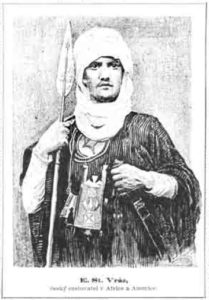 Prague, where he displayed various items from those parts of the world. At that time Vraz was living on money he was getting from sending raw materials to Europe. But he soon left for South America, where he traded in India-rubber, together with a countryman of his, a man called Brazda. In 1890 he set out on his most famous journey along the Orinoco river down to the Amazon river and then across the Cordilleras down to the Pacific coast. He described his experiences on this journey in a book called 'Across Equatorial America', which was published in the year 1900."
Prague, where he displayed various items from those parts of the world. At that time Vraz was living on money he was getting from sending raw materials to Europe. But he soon left for South America, where he traded in India-rubber, together with a countryman of his, a man called Brazda. In 1890 he set out on his most famous journey along the Orinoco river down to the Amazon river and then across the Cordilleras down to the Pacific coast. He described his experiences on this journey in a book called 'Across Equatorial America', which was published in the year 1900."
From there he started sending all kinds of items to Naprstek, and in 1894, shortly before Naprstek's death, he returned to Prague and started giving lectures at his museum and integrated fully into Czech cultural and intellectual life.
As far as his name is concerned, he claimed that it was a pseudonym, and that he borrowed the name Stanko Vraz from a Slovenian national freedom fighter. In his autobiographies he writes that he feels warm affinity to the Czech nation thanks to a visit as a young man to Prague's National Museum when he was feeling down. The collections made such a strong impression on him, that he decided to devote all his future work to the Czech people.
Soon real deeds followed, and Vraz joined the struggle of the Czech nation for freedom and independence from the Austro-Hungarian monarchy. Vraz was expelled from Bohemia several times, because he had an American passport and the government forced him out of the country for political reasons. Talking about passports, Dr. Kandert told me that his colleagues had found several passports that Vraz used, including a US passport and a Venezuelan one, but each of them contained a different place of birth and sometimes even date of birth.
"After staying some time in the United States but mainly following the great success his lectures had in Prague, Vraz decided to create a project called Orbis Pictus - or the Picture of the World - a kind of richly illustrated encyclopaedia, complemented with lots of photos, about nations and their cultures in various parts of the world. To fulfill this goal, he again traveled to various countries, and he must have been a brave man, because some of the regions were truly volatile, such as China which he visited during the so-called 'Boxer uprising.'"
Vraz proved his boldness also by visiting those parts of New Guinea where only a few people had been before him, and he brought back collections which even nowadays are considered to be most precious, because at that time nobody did collecting in those parts of the world.
"Vraz also played an active role in the creation of independent Czechoslovakia in 1918, when he helped the future president Tomas Garrigue Masaryk and other emissaries of the Czechoslovak exile government to establish contacts with Czechoslovak ex-patriots in the United States. It is interesting that unlike other builders of the Czechoslovak state he never received any distinction. Nor was he offered a significant post. "
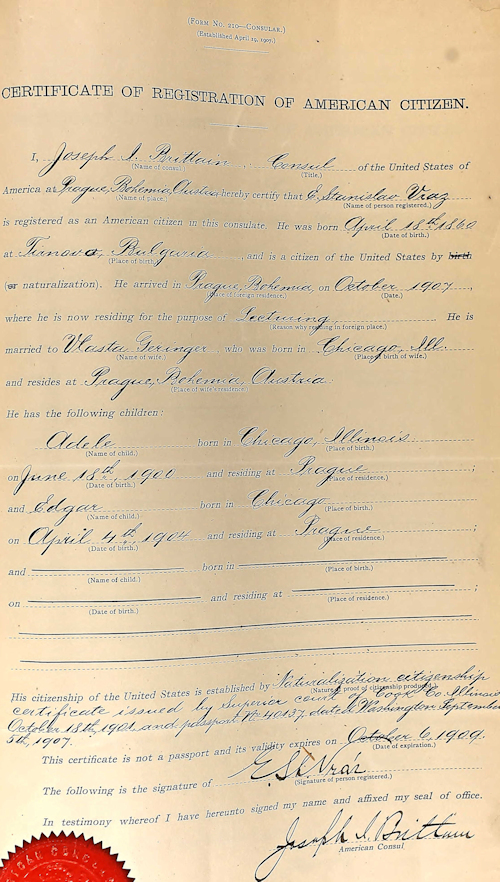 He returned to Czechoslovakia from the United States as a private person with the aim of settling down in Prague, which he did, but at that time he was already a seriously ill middle-aged man. It is said that he suffered from several kinds of venereal diseases, which he tried to cure himself with the help of arsinic and similar drastic methods. The result was that his left hand had to be amputated.
He returned to Czechoslovakia from the United States as a private person with the aim of settling down in Prague, which he did, but at that time he was already a seriously ill middle-aged man. It is said that he suffered from several kinds of venereal diseases, which he tried to cure himself with the help of arsinic and similar drastic methods. The result was that his left hand had to be amputated.
Many Vraz's letters indicate that he was not much fond of women, but in Prague he fell in love with a young woman from Chicago, the daughter of an American newspaper tycoon, a descendant of the Geringer family, and three years later they married. They moved to the United States, and during a journey to Mexico, they both climbed Popocatepetl volcano. In 1921 Vraz arrived in Prague to give lectures, and in last years of his life he also spoke on the radio. He died in Prague in February 1932.
Dr. Kandert told me that Enrique Stanko Vraz was a kind of independent traveler. Independent because in terms of preparations for his trips to remote areas he did all the organizational work himself. But in South America, for example, he used specially trained men to carry all his luggage and when sailing on the two big rivers - Orinoco and Amazon - he of course used rowers and his ship had a captain.
"Enrique Stanko Vraz never wrote an autobiography, but his daughter, Mrs. Vlasta Vrazova did write a biography of him . It is based on diaries he used to write during his travels. The diaries, however, have not been preserved. Mrs. Vrazova lived in Czechoslovakia till the Nazi occupation in 1939 and then she moved to the United States, as she had American citizenship. She returned to Czechoslovkia after WWII as a United Nations Relief and Rehabilitation Administration representative, but as such she was a thorn in flesh of the Communist authorities when they seized power in 1948, and she was expelled from the country."
The Communists confiscated all her property, and her father's diaries disappeared - either during the confiscation or she herself destroyed them - no one knows.
The Vrazes had two children, a daughter and a son, and for many years the family lived apart - while Enrique lived with his daughter in Czechoslovakia, his son stayed in the United States with his mother. And so even in his family life, Enrique Stanko Vraz remained a traveler.
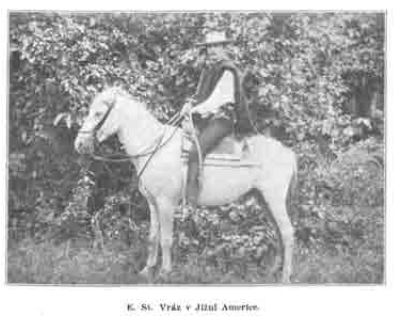
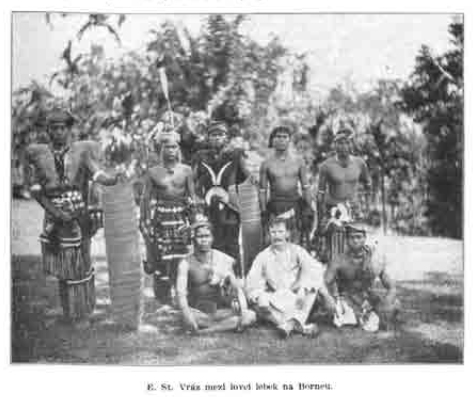
Images above and below found in the Geringer Press Publication Amerikan Kalendar.
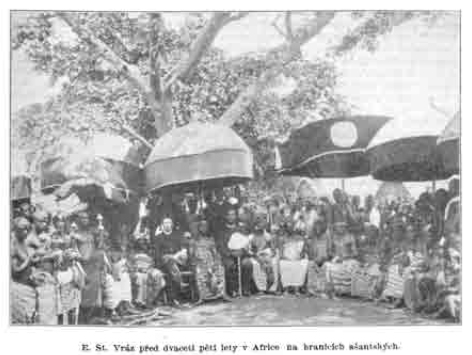
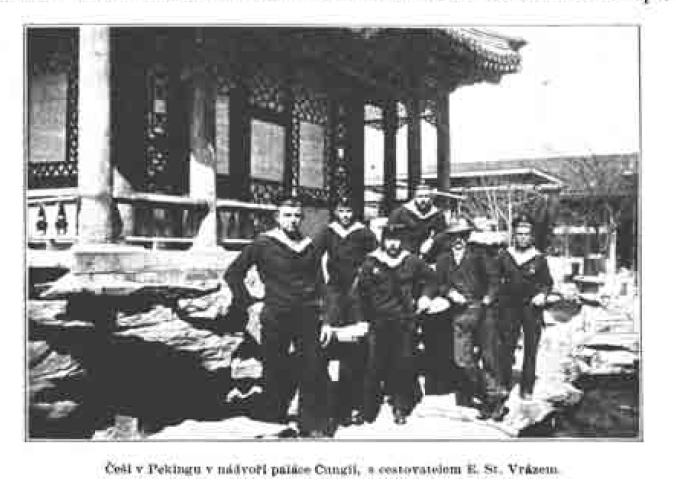
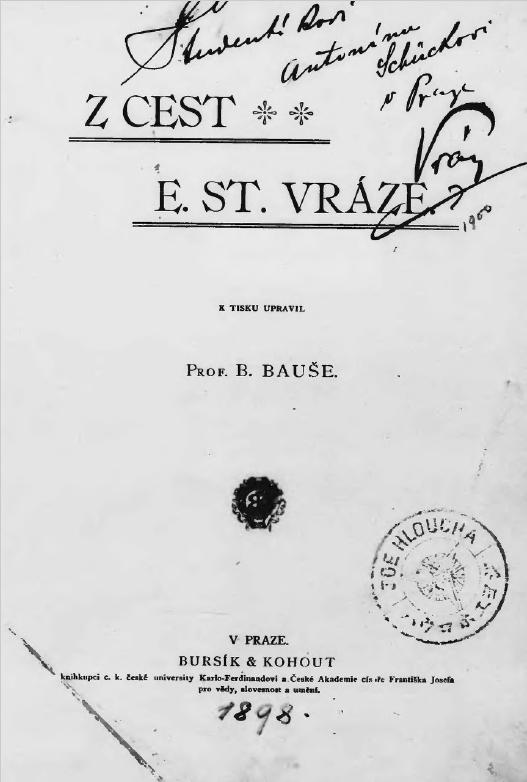
Google Translate:
From the roads
E St. vrazProf. B. Bause
into the blank
bursik & kohout
1898
Vlasta Adele Vraz
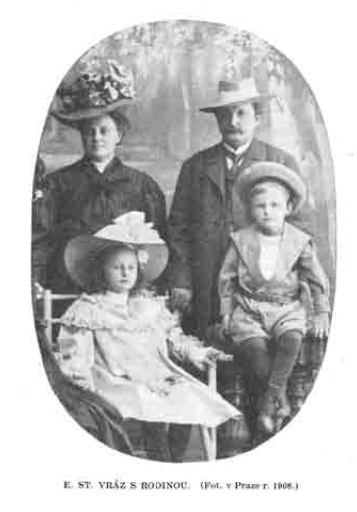
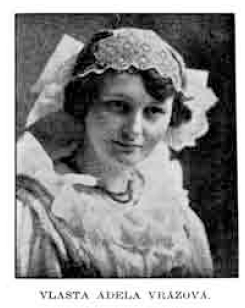
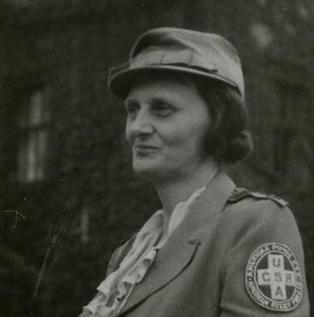
Editorial Note
On April 9, 1949, Vlasta Adele Vraz, the head of the Praha office of American Relief for Czechoslovakia, was arrested in Praha by [Page 398]the Czechoslovak police. Miss Vraz appeared to have been arrested on suspicion of alleged “political” activities. On April 13, the Department of State issued to the press a statement describing the known circumstances of Miss Vraz’ arrest and reviewing the many awards and commendations which she had received from the Czechoslovak Government for her relief services in Czechoslovakia. For the text of the statement, see Department of State Bulletin, April 24, 1949, page 536. The Embassy in Praha made repeated representations to the Czechoslovak authorities regarding Miss Vraz’ arrest. On April 12 an Embassy representative was permitted to visit her in the presence of Czechoslovak Foreign Ministry and police officials. Miss Vraz was finally released on April 16 following delivery of a note of protest from Ambassador Jacobs to the Czechoslovak Foreign Ministry. The Ambassador’s note expressed concern over the “sudden and drastic action” taken in arresting Miss Vraz and drew attention to the fact that Czechoslovak authorities had added another case to the increasing number which was arousing American public opinion over the treatment of American citizens in Czechoslovakia. The note demanded a complete report on Miss Vraz’ arrest and her prompt release should charges against her prove to be unsubstantial. Soon after her release Miss Vraz closed the Praha office of her relief agency and returned to the United States.
https://history.state.gov/historicaldocuments/frus1949v05/d243
VLASTA ADELE VRAZ, 89, CZECHOSLOVAK ACTIVIST
August 24, 1989
Vlasta Adele Vraz was the director of American Relief for Czechoslovakia after World War II, was arrested by the Communist government there and later became the longtime president of the Czechoslovak National Council of America. Miss Vraz died Tuesday in Central Du Page Hospital, Winfield, at age 89.
Miss Vraz, a resident of Berwyn, was a third generation Czech-American and the daughter of a prominent Czech family here.
Her grandfather, August Geringer, founded the first Czechoslovak national newspaper in America, Svornost, in 1875, which was published at 26th Street and Crawford Avenue.
Her father, Enrique Stanko Vraz, was a famous Czechoslovak explorer and naturalist.
Miss Vraz was born in Chicago and worked for the family newspaper, according to her longtime friend, Eleanor Lonek of Oak Park.
Miss Vraz went to Czechoslovakia in 1919 to be secretary to her father, who was lecturing there. Eventually, her mother also moved there, and the family stayed for 20 years. Miss Vraz became a translator of Czechoslovak literary works and wrote a biography of her father.
In 1939, she watched the German army march into Prague. Miss Vraz and her family returned to the U.S. that year, and during the war she served as secretary to the president of the Czechoslovak government in exile in Washington, Lonek said.
In 1945, Miss Vraz was sent back to Czechoslovakia by the American Relief effort, first as an aide to the director, then as the director.
According to Tribune stories from the time, Miss Vraz was the sole agent for distributing $4 million in food, clothing and other supplies for the American Relief program there.
After the Communist takeover of that country, Jan Masaryk, the noncommunist foreign minister, decorated Miss Vraz with the Order of the White Lion for her work on behalf of the children of Czechoslovakia. This occurred only a few weeks before Masaryk`s mysterious death.
On April 9, 1949, Miss Vraz was arrested by the Communist authorities and held for a week on an accusation of anti-government political activity.
Protests from Czech-Americans and by the U.S. Congress prompted the Czechoslovak government to free her.
Miss Vraz was editor for 40 years of two monthly publications for the Czechoslovak National Council of America, the American Bulletin, and Vestnik. Services for Miss Vraz will be held at 10 a.m. Saturday in the chapel at 6507 W. Cermak Rd., Berwyn. She has no surviving relatives.
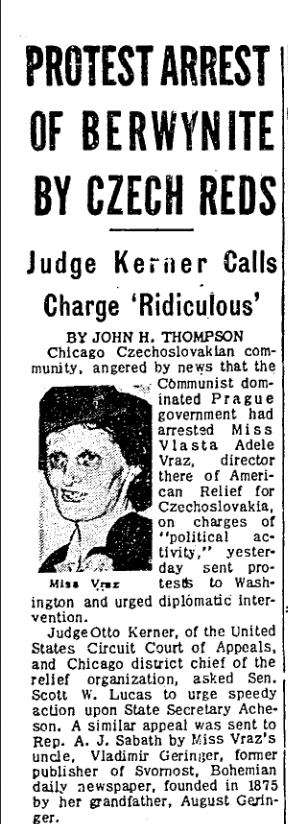 Chicago Tribune 4-14-1949
Chicago Tribune 4-14-1949
Chicago Czechoslovakian community, angered by news that the Communist dominated Prague government had arrested Miss Vlasta Adele Vraz, director there of American Relief for Czechoslovakia, on charges of "political activity," yesterday sent protests to Washington and urged diplomatic intervention. Judge Otto Kerner, of the United States Circuit Court of Appeals, and Chicago district chief of the relief organization, asked Sen. Scott W. Lucas to urge speedy action upon State Secretary Ache-son. A similar appeal was sent to Rep. A. J. Sabath by Miss Vraz's uncle, Vladimir Geringer, former publisher of Svomost, Bohemian daily newspaper, founded in 1875 by her grandfather, August Geringer.
Miss Vraz, 48, daughter of Mrs. E. S. Vraz, 2101 Elm wood av., Berwyn, had directed the distribution of American relief in Czechoslovakia since October, 1945. She had planned to return here by June, as soon as relief supplies reached Prague.
Calls Charge Ridiculous
"The charge of political activity is ridiculous”, said Judge Kerner. "It must be a mistake. She couldn't be guilty. Miss Vraz has done nothing but distribute the millions of dollar’s worth of milk, food, medicine, medical instruments, and clothing that American Czechoslovaks sent, to help the less fortunate in Czechoslovakia."
The United States embassy in Prague, which disclosed Miss Vraz had been arrested Saturday 4 announced she had told them she was being well treated.
Shortly before his unexplained death, a few weeks after the Communist seizure of power, the Czechoslovakian foreign minister, Jan Masaryk. decorated Miss Vraz with the order of the White Lion.
Hints At Vengeance
Miss Vraz's uncle suggested that her arrest might have been caused by the vengeance of a Communist employee whom Miss Vraz had discharged.
Miss Vraz last visited Chicago a year ago to lecture on living conditions in Czechoslovakia.
Her aunt, Mrs. Alma Merek, of the Berwyn address, said Miss vraz had scrupulously retrained from any political activity. Miss Vraz's mother, who returned last October after 14 months with her daughter, is ill. Her father, the late E. S. Vraz, was an explorer, author and lecturer.
A social worker. Miss Vraz-, was graduated from Harrison High school and attended the University of Chicago, she worked as a columnist on the Svomost before going to Prague.
Chairman Astounded
The chairman of the board of American Relief for Czechoslovakia today termed the arrest of Miss Vlasta Vraz in Prague "most astounding" and a rather ungrateful sort of procedure."
Dr. Kenneth Miller said Miss Vraz had been the organization's ' sole agent in dispensing more than ' $4,000,000 worth of relief supplies in Czechoslovakia since the war. Her arrest means the end of the the program, he asserted.
Dr. Miller said 'there is no foundation" for the charge that she engaged in political activity. "We are solely a relief organization and have engaged in no political ' activity of any kind," he said.
Most of the relief funds contributed to the group were used in a child feeding program.
Americans Expelled
PRAGUE, Czechoslovakia, April 13 (AP) The American embassy revealed today at least two American church workers have been expelled from Czechoslovakia in recent months and that the American head of an orphanage in Moravia is under orders to quit this country.
It also disclosed that Miss Vlasta Adele Vraz, of Berwyn, Ill., head of the Prague office of American relief for Czechoslovakia, has been held in prison by Czechoslovak police since Saturday, charged with "political activity."
Czech website - Good Vraz summary, excellent Vraz family images, easily translated using Google Translate -
Blog - Under Every Stone - A CZECH-AMERICAN PATRIOT - Vlasta Adele Vraz - Another good Vraz summary, excellent Vraz family images (some the same as above website). http://undereverystone.blogspot.com/2013/01/a-czech-american-patriot-vlasta-adele.html
